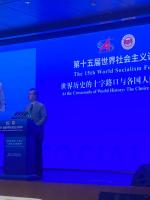Keywords:
Brexit, the working class & Labour’s lost election
On 31 January this year at midnight Central European Time Britain’s Prime Minister Boris Johnson banged a smallish looking gong to signal Brexit, his country’s exit from the European Union (EU). He had hoped to have London’s Big Ben chime the momentous hour but, like a lot else in Britain, it is currently out of order following decades of neglect.
The politics of Brexit, Britain’s exit from the European Union, involves three reasonably distinct positions. What makes the issue confusing is that two of them, which backed leaving the EU and are wholly at odds with the third, which supported remaining in the EU, have become blurred by inadequate media coverage and general ignorance of the issues so as to seem identical. This has been largely because the ‘remainers’ have been an influential voice in the public debate in the last few years, backed by high visibility pro-EU campaigns. No wonder, then, that outside Britain the politics of Brexit seems a mass of confusion, but one in which the ‘remain’ voice has tended to be presented as the more reasonable and progressive.
The reason getting out the EU became such a prominent item on the political agenda in Britain was because on 23 June 2016 there was a national referendum on whether the country should leave or remain part of it. Pressure for this had been growing for some years. On the day voter turnout was just over 72% of the electorate. 51,89% voted for Brexit, 48,11% voted to stay.
The next year there was a general election. The ruling Conservative party, the leadership of which had banked on an anti-Brexit outcome to the referendum, fared far worse than expected, but scraped by with 42% of the vote to form a minority government, in which it was propped up by its right-wing bedfellow the Democratic Unionist Party. The Labour Party, under its newly-elected socialist leader Jeremy Corbyn, did astonishingly well, contrary to the polls, gaining 30 seats in Parliament, and 40% of the vote. Labour had run a strong campaign on a progressive election manifesto for socialist change, including getting a good negotiated deal with the EU on exiting the bloc, a deal that would retain the substance of EU laws that were beneficial to UK workers. During the referendum on the EU, the Labour Party had campaigned for the country to remain in the bloc, but changed its approach in light of the referendum result.
Zip forward to the December 2019 British election. The Conservatives, under their new leader Boris Johnson, whose campaign centred solely on the slogan “Get Brexit Done”, won a landslide victory, gaining 48 seats and 43% of the vote. Labour was pounded at the polls, losing 60 seats, its worst defeat since 1935. Though Labour ran on an election manifesto that again promised massive socialist-oriented change in Britain, whose working class and poor have suffered massively at the hands of the right-wing Conservatives, it was judged mainly by its stand on Brexit. This stand had shifted since its 2017 manifesto from one of seeing Brexit through with a good deal to a fudge designed to appeal to both leavers and remainers, and containing the promise of a second referendum. The tactic was disastrous. Traditionally solid Labour areas voted Conservative, and the ‘red wall’ of pro-Labour constituencies across much of northern England took on the ‘blue’ of Conservative-voting areas.
European Union myths
A major argument of the remainers, and something that drove a lot of the pro-EU sentiment that mushroomed particularly among bourgeois liberals after the 2016 referendum, was that leaving the EU meant cutting away from “Europe”. Doing so would be a philistine snub to internationalism, multilateral cooperation, and multiculturalism. The sentiment had little basis in reality, but is does show that EU has done a good job with its self-mythologising and PR, asserting itself as a distillation of all that is well and good about Europe.
The EU brand posits the bloc as synonymous with the European continent. The 27-member state bloc characterises itself as Europe proper, and refers to the 22 countries in the European region that are not in the EU (23 if we now count Britain) as “Wider” Europe. Earlier, before the collapse of Soviet Union and its allies, and when the continent was more politically diverse, Europe was defined as stretching from the Atlantic seaboard in the West to the Ural Mountains in Russia and Kazakhstan in the East. EU hegemony over a good chunk of the continent has been accompanied by a recalibration of what “Europe” means.
Then there is EU identity, with its flag and anthem, its Europe Day (celebrated on both 5 and 7 May – a clumsy attempt to include the Council of Europe, a rule of law and human rights organisation that is not part of the EU). It’s all steeped in symbolic mumbo-jumbo. The flag is a blue background, representing the western world’s apparently unique blue sky, with a circle of 12 yellow stars – 12 being an ideal number according to different mythologies. The motto of the EU is “United in diversity”, which sounds nice but jars with the EU’s drive for neoliberal capitalist uniformity. The EU anthem is Beethoven’s Ode to Joy, from the composer’s 9th Symphony, and written in 1824 – not long after Napoleon’s wars devastating across Europe that left up to six million dead – to express the need for universal solidarity, peace, and an end to war.
Military ambitions
But spurred in part by US President Donald Trump’s complaints that the US spends too much on Europe’s defence and partly by the bloc’s increasingly hostile relationship with Russia, the EU has been ratcheting up its efforts to develop its offensive military capability. This includes tighter military cooperation, under the Pesco (Permanent Structured Cooperation). In 2017, the European Parliament rubber stamped the governing European Commission’s design of a European Defence Fund, which, according to the European Network against the Arms Trade, “enshrines the EU paradigm shift towards hard security and military answers to complex problems, as well as the over-influence of the military-industrial complex on EU policy developments: the same companies that are advising the EU will then be the main beneficiaries of this funding.” The EU is also developing what it calls “military mobility” to fast-track the movement of troops and equipment across the EU area in response to “crises”. And it has been upgrading funding for “civilian and military missions” outside the EU region. There are currently 16 such missions on three continents.
The sharpened military capability sought by the EU highlights the problem that critics of the bloc frequently cite: its lack of democracy. Once decisions are taken and put into the pipeline by the EU Commission there is very little to stop them. It’s all one way traffic, backed by massive but shadowy big business lobbying. We have yet to see the consequences of this in terms of the EU’s ominous military development. But the effects are conspicuous when we consider the true driving force of the EU, its single, deregulated capitalist market.
Scant democracy
EU decision-making and democratic processes are rather like the trickle-down theory of development used by capitalist economists, who argue that tax breaks and benefits for big corporations ultimately benefit the poor by growing economies. Decision-making in the EU is not wholly divorced from voters in member states. But the democracy that does exist trickles down feebly into the EU system. It is the voters who elect the governments who appoint the officials that run the EU, and the voters who elect the Members of the European Parliament (MEPs) which can accept or reject legislation. But that’s all. The highest decision-making body in the EU is the European Council. This comprises heads of government from each member state plus the president of the EU Commission and the EU High Representative for Foreign Affairs and Security Policy. This Council meets four or more times a year to decide the EU’s policy priorities. The job of fleshing out the policy agenda of Council meetings is done by the 150 working groups of the Committee of Permanent Representatives (known as Coreper). This is made up of civil servants from national ministries. The meetings of these working groups take place behind closed doors and are not subject to public scrutiny or media coverage.
The main executive work of the EU is done by the European Commission, which submits decisions to the Council and develops legislation. There are 27 commissioners, including the President of the Commission, one from each member state. The European Council appoints the President of the Commission, while the governments of the member states select the commissioners.
So the executive bodies of the EU – the Council and the Commission – have only tenuous democratic ties in terms of their composition to the populations of the member states. When it comes to decision making, the Commission is a law unto itself. The European Parliament, made up of MEPs elected in the member states, is allowed to endorse, reject or amend legislation put to it by the Commission, but it cannot initiate legislation of its own for the Commission to carry out. The parliament is the only direct channel between the EU and voters in the member states. But the ratio of MEPs to voters makes the notion of constituency representation laughable: Britain had 73 MEPs representing 65-million people.
Capitalist freedoms
The problem of the EU is that it exists in the first place to spearhead a single capitalist market designed to out-compete any other worldwide. In another set of circumstances there would be nothing necessarily wrong with European integration. It would depend on its political orientation. There’s no reason why, in some future configuration of socialist states, we couldn’t have a socialist single market. But the current EU single market is hardwired to promote deregulated capitalist development, and, as Thomas Fanzi wrote in Jacobin online magazine in May 2019, devoted to “codifying the four capitalist freedoms par excellence — the free movement of goods, services, capital, and persons — and placing huge barriers in the way of state intervention in the economy … [laying] the basis for a wholesale reengineering of European economies and societies.”
EU employment legislation does contain a number of regulations that protects workers’ rights, aims to break down gender, disability and other discriminatory barriers to the full employment, and upholds strong occupational health and safety. It is a reminder that it is in the interests of unfettered capitalism to exploit the labour of every available human unit. Thus, while the EU has legislation – often hazily implemented – supporting the workplace rights of workers, it nevertheless undermines trade union rights and collective bargaining. The “free movement” of labour is more often than not a means to import labour from poorer EU areas to wealthier ones, to undercut the better – trade union protected – pay and conditions local workers struggled for decades to achieve. Conversely, many businesses based in richer countries have shifted production or processing to poorer parts of the EU, especially the South and East, where local wages are bad and conditions poorly regulated.
The EU also favours big business by more heavy handed measures. It drives a bruising austerity policy in the Eurozone, the area of the EU that uses the Euro currency, by capping government deficits at 3%, imposing a ratio of government debt to GDP at less than 60%, and stipulating governments’ adherence to fiscal discipline. These treaty-enshrined measures have been enforced more severely since the 2008 financial crash.
Devastating austerity
In Britain, which was not part of the Eurozone but has taken EU-style austerity to extremes, the right-wing Conservative governments of the 2010s imposed vicious government spending cuts. Crisis hit, capitalism in Britain and the EU overall resorted to what it does best in such situations, which is to take back the small change doled out to the working class in the form of social security and public services.
Britain has been ruled by Conservative governments since the end of the 1970s, when Margaret Thatcher took power and oversaw spending cuts and rapid deindustrialisation that decimated working class communities. There was a notable hiatus between 1997 and 2010, when a centrist Labour government was in power and, though avowedly anti-socialist and a champion of bourgeois exclusivity, improved public spending and poverty reduction in some respects, though not enough to reverse the damage of nearly 20 years of right wing policies. Labour’s approach was brutally reversed under the 2010-2019 Conservative governments of David Cameron and Theresa May, when cuts to welfare, housing subsidies, and social services totalled £30-billion (R580-billion).
In 2018, the United Nations Special Rapporteur on Extreme Poverty and Human Rights, Professor Philip Alston, described the devastating impact of austerity in Britain – the world’s fifth largest economy – following a fact-finding mission:
“…the immense growth in foodbanksi and the queues waiting outside them, the people sleeping rough in the streets, the growth of homelessness, the sense of deep despair that leads even the Government to appoint a Minister for suicide prevention and civil society to report in depth on unheard of levels of loneliness and isolation. And local authorities, especially in England, which perform vital roles in providing a real social safety net have been gutted by a series of government policies.
“.…14 million people, a fifth of the population, live in poverty. Four million of these are more than 50% below the poverty line, and 1,5-million are destitute, unable to afford basic essentials. The widely respected Institute for Fiscal Studies predicts a 7% rise in child poverty between 2015 and 2022, and various sources predict child poverty rates of as high as 40%. For almost one in every two children to be poor in twenty-first century Britain is not just a disgrace, but a social calamity and an economic disaster, all rolled into one.” ii
Writing about the impact of years of marginalisation and depravation on the mining towns of Britain’s East Midlands, In the London School of Economics Brexit blog, researcher Liza McKenzie describes the impact of years of marginalisation and depravation on the mining towns of Britain’s East Midlands:
“These communities were heavily industrialised, and filled with skilled manual labour jobs for both men and women. They were wiped clean by de-industrialisation, and left void of work and investment for decades. In the last ten years, particularly since the 2008 banking crash, new jobs have emerged in warehouse and distribution work, payday loan companies, and slum landlording. De-industrialised areas are fertile ground for exploitative industries. Land, people and labour are cheap. Warehouses can be constructed in days and disassembled and taken somewhere else if the land, the people or the labour ask for more. Migrant workers from eastern Europe have been recruited into the area to work and live in these exploitative industries. Women like ‘Sally’ [who McKenzie interviewed] from east London have been socially cleansed out of the expensive land of the global city and are being rehoused in the privately owned and rented ‘pit houses’ owned by slum landlords in the deindustrialised North and Midlands.”iii
Brexiteers
The remote, elitist, undemocratic EU has had nothing to offer such communities, other than to exacerbate their plight through its policy on the free movement of labour. And yet people’s taxes were used to fund the EU. EU austerity policies and rules on capitalist market competition would act as a punitive brake on any potential socialist reconstruction of Britain of the kind envisaged by the 2017 and 2019 Labour Party manifestoes. During the Brexit referendum campaign the Labour Party campaigned to remain in the EU, but its stance often appeared equivocal, a slight foretaste perhaps of the disastrously neutral strategy on Brexit and support for a second referendum it opted for in the December 2019 election. Scotland and most of Northern Ireland swung with the ‘remain’ vote during the election. This may have been in part because the image of the EU is less tainted in the impoverished communities in those countries of the UK, which have benefitted somewhat from EU regional assistance funding. Poor communities in the UK have not been eligible for such help.
We should not confuse the anti-EU sentiments of working class people who voted for Brexit because of the Union’s disregard for their plight with the antipathy towards the EU by the other category of Brexiteers, who wanted out on purely nationalistic grounds, despite there being some overlap between the two. The latter for the most part comprises far right wing supporters of the Conservative party, members of the UK Independence Party and the Brexit Party and of fascist organisations. Their platform has been avowedly xenophobic and racist, and rooted in a seedy latter day Little Englander idiocy that sentimentalises Britain’s imperial history. You find far right sentiments rooted in racism against EU migrant workers in working class communities, so the distinctions between the two different Brexit support bases has not always been so clear cut.
Boris Johnson campaigned feverishly for Brexit during the referendum campaign, touring the country in a big red bus emblazoned with the totally false claim that Britain was contributing £350-million a week to the EU that should be spent on the National Health Service. The raucous, flag waving right-wing Brexit campaign wholly eclipsed the more rational, underfunded and progressive Lexit, or Left Exit, campaign pursued by the Communist Party and others. Rightwing support for Brexit is not based on criticism of the EU’s big business and neoliberal identity. It just wants neoliberalism to be put on a squarely national basis.
During the long period between the result of the referendum and Britain’s formal departure from the EU this year, during which the Conservative government faffed around with negotiating a withdrawal agreement, the rightwing calls for Brexit grew ever more shrill. Among the liberal bourgeoisie, on the other hand, there emerged the EU-flag-waving People’s Vote campaign, launched in 2018 to champion a second referendum. This amply funded campaign, which soon gained much sympathetic media coverage, was supported by a broad span of parties, including significant sections of the Labour Party, the Green Party, the Scottish National Party, and the Welsh independence party Plaid Cymru. In October 2019, the People’s Vote held a march through London that, according to its organisers, attracted a million supporters.
Much of this remain campaign was infused with pure sentiment, a hazy sense of belonging to some indefinable “European identity” that the EU appeared to offer. Scan the press during the 2016-2019 and you’ll be hard pressed to find any solid analysis of precisely what it is about the EU that was seen to be so wonderful. Rather, the middle class liberal narrative simply saw exiting the EU as being tantamount to getting into bed with the likes of Donald Trump and a bunch of racists. They had little inkling of the feelings of working class people stranded in poor towns and cities far away from the buzz of urbane London. The idea of the EU as a benign outfit is in part a throwback to the 1990s and early 2000s, when the bloc experimented with developing a ‘social dimension’. This introduced certain social democratic ideas, such as tackling poverty and social exclusion, and posited the idea of developing a rudimentary social policy for the EU. The 2008 financial meltdown saw the EU social dimension largely jettisoned in favour of austerity.
The influence of ‘remain’ wing of the Labour Party, bolstered by the all the clamour of the People’s Vote, led to the party taking a middle course of neither backing Brexit nor opposing and deciding to support the second referendum. The tactic, along with a dirty, fake news spattered media campaign against Labour leader Jeremy Corbyn, lost Labour the December election. Working class voters, fearful – given the mobilisation of the bourgeoisie to support staying in the EU – that the outcome of the 2016 referendum would be overturned by a second one, were fully prepared to hold their noses and vote Conservative as long as it guaranteed getting out of the EU.
The Communist Party campaigned in the election for a Labour victory based on its radically progressive manifesto. The party argued that the priority was to get the Conservatives out of office. But it would continue to campaign against the EU, “recognising that the treaties, rules, directives and policies of the EU are designed to protect big business interests and their capitalist markets against any advance towards socialism in any EU member state.”
The message carried little traction among working class voters in the traditionally Labour-held poor communities of the North and Midlands, if indeed these voters ever heard what the communists had to say. For them the election was about one thing only – getting out of the EU. There is at present no vanguard party of the working class in Britain, one able to significantly educate workers and the poor on the need for socialism. Communist activism barely registers – despite the solid work done by of the Communist Party and the progressive parts of the trade union movement – a legacy of decades of splintering sectarianism and factionalism among the left. So who could blame people from deracinated and deprived communities for opting for the party that had at least the stated aim of getting out of the EU?
And now?
Labour’s defeat sparked a leadership contest, to be finalised by early April this year. It will likely result in the party moving away from the progressive left vision of its last election manifesto. Corbyn has been unjustly blamed for losing the election, the defeat seized upon by his opponents on the right of the party to shift Labour away from socialist positions, though it was the hopelessly nebulous approach to Brexit, not the radical party manifesto, that cost Labour so dear.
The Conservatives, meanwhile, buoyed by their large majority in Parliament are likely to make Brexit do all it can for British big business. There is now a transition period. Much depends on what sort of trade deals with the EU and elsewhere the Conservatives will manage to broker. Britain will operate on World Trade Organisation rules. One fear is that Boris Johnson’s government will open the way for capitalist market access to supplies and service procurements for the National Health Service, the country’s last nationalised sector – something Donald Trump apparently has beady his eye on. After years of austerity, the Conservatives may feel they can well afford to splash out a bit on regenerating long neglected parts of Britain where the working class vote for once went their way. But whatever they do, the impact on poor communities is likely to be cosmetic.
Only the huge transformations envisaged by the two last Labour Party election manifestos – embracing the re-nationalisation of key national assets that were privatised by the Conservatives, targeted investments in education, health, social development, housing, infrastructure, and a reorientation away from Britain’s hawkish posturing internationally – will provide the changes needed to make Brexit a fair deal in the long run. And for that to happen the left will have to muster the clout needed to elect a left Labour government.
Cde Waller is a member of the Communist Party of Finland living in SA, and a sub-editor of the African Communist and Umsebenzi.
Article has beem published in the African Communist 1/2020.
i Free food distribution points for people unable to afford food, In 2017 there were 2 000 foodbanks in the UK.
ii For full report see https://www.ohchr.org/Documents/Issues/Poverty/EOM_GB_16Nov2018.pdf
iii See https://blogs.lse.ac.uk/brexit/2018/01/15/we-dont-exist-to-them-do-we-wh...




